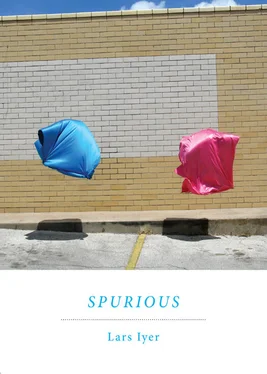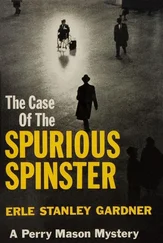We’ll be found wanting, we know that. We two above all — we’re terribly guilty. What’s to become of us — of us in particular? No one believes in us. No one listens. We’re out on a limb — terribly far — and we’re sawing it off. We’ll fall off the edge of the world. We are falling — who believes us? Who believes in us?
These are our thoughts on the train that rushes through the night. We’re drinking gin with great determination. We have to drink! drink! until we can no longer say the word, Messiah . That’s our punishment, and we must be punished. This is what it has come to, here in the dark, rushing forward …
What place do we have in the world? None. Where’s it all going? To perdition. To desolation, and to the abomination of desolation. And are we going with it? All the way! That’s where we’re heading now with our gin and our apocalypticism, full speed into the night.
Messianism has driven us mad, or half mad, we decide. What else have we been thinking about? What else has driven us through our reading and writing? We’ll be glad when it’s over: but when will it be over? There’s no sign yet. Messianism hasn’t finished with us.
We’re fated in some way. We’re circling round and round what we cannot possibly understand. And isn’t that why we’re drawn to it? Isn’t that the lure? You cannot understand this idea. You’ll never understand it, not today, not tomorrow. But the day after that? we ask. The day after tomorrow?
That’s our faith: it’s not faith in the Messiah, but that we might be brought into the vicinity of the idea of the Messiah; that a little of its light might reach us. The Messiah: isn’t he forever beyond us, just beyond? We’ve always just missed him. We missed the appointment …
Wasn’t he supposed to arrive here, now? Not today, and not even tomorrow. But the idea of the Messiah: might we reach that? Is there something left of his passing, some trace — some sign? The day after tomorrow: that’s when it will reach us, if it does: the idea of the Messiah.
But won’t it have been too late? Won’t the page have already been turned? But perhaps that’s what it means: the idea can burn only for those who cannot see it, who have already gone under. It’s on the other side of the mirror, although all they can see are their own stupid faces.
And what do we see, in the reflective surface of the train windows? Whose faces are those behind the glass? — ‘My God, look at us’, says W. ‘Look what we’ve become’.
The water taxi to Mount Batten. We’re in choppy water, but sit out nevertheless on the exposed part of the deck. — ‘Poseidon must be angry’, says W. as the surf splashes over us. W.’s learning Greek again. Is it the fifth time he’s begun? The sixth? It’s the aorist that defeats him, he says. Every time.
It’s choppy! — ‘We should libate the sea’, says W. Then he asks me if I know why the sea is salty. It’s because the mountains are salty and the sea is full of broken up mountains, he says.
It’s also full of ozone, of course. That’s what cheers you up when you’re near the sea, W. says, the ozone that choppy water releases into the air.
Have we failed? W. is certain: we are complete failures. We should be drowned like kittens, he says, for the little we’ve achieved. But what chance did we have? I ask him. What could we have done, under the circumstances? That’s always my question, W. says. — ‘You’re always looking for excuses. It’s your Hindu fatalism’.
W. says my entire worldview is organised so that I never have to take responsibility for anything, even my supposed Hinduism. W. was brought up with the idea of eternal damnation, he says, and the thought of it still makes him shiver. Hindus are immune, W. says. I should try living as a Catholic and then I’d see (W.’s family were converts, of course). And as a Jew (W. is Jewish by bloodline). — ‘It’s the guilt that’s worst’, says W. ‘The sense you can never measure up’.
‘Detachment, that’s what you Hindus have to achieve to escape the wheel of rebirth, isn’t it?’, W. says. Moksha: the cessation of desire. It makes sense to him, W. says. Look at my flat, for one thing. It’s disgusting. Do I desire to clean it up? No. Do I desire to deal with the damp? Not really.
‘It’s a kind of test for you, isn’t it, your damp?’ W. says. All I have to do is to desire not to change it, W. says. All I would have to say is, The damp is eternal; I accept that now . That would be moksha , wouldn’t it? Ah, if only it were as simple for him, W. says.
‘This is how proper people think’, says W. in the beer garden in Turnchapel, his arms held behind his back and his head raised. ‘Do I look as though I’m having lofty thoughts?’
What thoughts has he had? I read from the back of his notebook. The messianic and the apocalyptic , it says, the ‘and’ underlined. Pathos , it says. Blood in the chinks between the stones of the law — Kafka , it says. Groessen = dimension , it says. Capitalism = paganism . And then, The real future is waiting to happen beneath the marketing of the future .
And then, a little further on: We have to live two lives, one turned to the world and to the horror of the world, and the other turned to our friends . And still further on, Eternity in time . And then, Kafka — thin, Brod — fat .
There’s a list of ingredients, too: juniper (Italy), lemon and orange peel (Spain), orris root (Italy), Angelica root (Low Countries), cardamom pods (Sri Lanka), coriander seeds (Russia) . And some tasting records: Warm spiciness. Peppery notes. Earthiness and sweetness . That was from the visit of the Chief Distiller of Plymouth Gin, W. says.
W. cherishes my special love for Turnchapel. I become gentler when I’m there, he notes, kinder. He likes my tender side. In another life, I could have lived here, imagine … We muse wistfully on what I might have been like. — ‘A better person’, W. thinks, ‘taller, with some nobility of character’.
In the staff dining room, framed portraits of VCs in their robes all around us, W. confides that he thinks he’s on the brink of an idea. He’s never had an idea before, so he doesn’t quite know what it’s like. But he thinks this is it: he’s on the brink of an idea; a new horizon is opening before him. Have I ever had an idea? he asks. Of course not, he says, why is he asking? Have I ever thought I was on the brink of an idea, and that people would haul me up on their shoulders and carry me around, cheering?
‘Of course you never thought you’d have an idea for a moment, did you?’, W. says. ‘You actually repel ideas and intelligent thought’, W. says. ‘Never for a moment would you be capable of thinking’, W. says. ‘Not for one moment!’
When he was young, W. was sure that one day, if he worked hard enough, he’d have an idea. He lodged in an attic room in which there was only a bed and a work table. A bed and a desk, W. emphasises. He rarely left it, his attic room, W. says. He worked night and day. Reading and writing were all that mattered.
What happened? Ah, we know what happened! He’s told me a million times! He’s told everyone! He discovered drinking, says W., and smoking! He came late to both, but when he discovered drinking and smoking that was it! But no doubt he began drinking and smoking from a sense of disappointment, from the knowledge he’d never have an idea and that there was no point in going on, he says. Yes, that’s what happened, W. says: disappointment, and then drinking (and smoking). Then there was the apocalypse, which made things even worse.
Читать дальше












